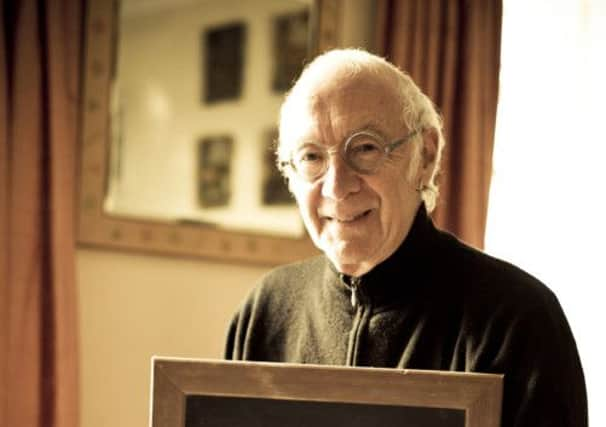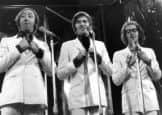Roger McGough: Poetry isn’t the new rock’n’roll


HE’S a much-loved poet, broadcaster, children’s author and playwright who has, in a former life, been part of a chart-topping band and hung out with cultural icons such as Bob Dylan, John Lennon and Marlon Brando.
So when Roger McGough, dubbed “the patron saint of poetry” by laureate Carol Ann Duffy, says he’s not a confident person it seems hard to believe. His production of The Misanthrope – Moliere’s classic tale of manners and morals set in 17th century France – is currently earning glowing reviews. But when he was initially approached by the English Touring Theatre to do a new adaptation of the play he wasn’t sure he would be up to the job.
Advertisement
Hide AdAdvertisement
Hide Ad“When I was asked my first thoughts were ‘I can’t do that, I’m not clever enough,’” he says. “But then uncertainty and a lack of confidence have always marked me.”


But if McGough is diffident he is also warm, witty and thoughtful. He made his name back in the 60s with musical trio The Scaffold and as one third of The Mersey Sound, along with fellow poets Adrian Henri and Brian Patten.
Since those early, heady days he has established himself as one of our most popular and prolific writers. As well as being president of the Poetry Society he presents BBC Radio 4’s long-running Poetry Please and this month he is in Leeds as one of the headline performers at this year’s Headingley Litfest.
His latest collection of poems, As Far As I Know, was published last year proving that at 75 he has lost none of his skill and irreverence. But he says writing doesn’t get easier as he gets older. “With something like The Misanthrope you’re telling a story, you have to make the verses sing and be funny when necessary but you know where it ends.
Advertisement
Hide AdAdvertisement
Hide Ad“With poetry you don’t have that and each time you go and write you’re on your own with a pen and paper. There’s no past and no future and it’s only once you start that you begin to develop ideas, but you never know where it’s going to take you and you don’t know where the poem will end.”
McGough was born and raised in Liverpool. He came from a working class family and although he was a bright child he’d didn’t have a burning passion for poetry and literature as a youngster. “So many poets you speak to say it was an English teacher at school that got them into it, but I didn’t have that.
“We didn’t have any poets in our family and I was the first generation to get a scholarship and go to university.”
He studied at Hull during the mid-50s by which time his interest in literature had been stirred. “One of the guys I was living with had a copy of Under Milk Wood by Dylan Thomas and I thought ‘wow, this is great.’
Advertisement
Hide AdAdvertisement
Hide Ad“I read James Joyce and started writing short stories and plays, but even then poetry was always central to what I was doing.”
He was at Hull University when Philip Larkin was working there. “He was sub-warden there but he didn’t really mix with the students and I didn’t have the confidence to go and talk to him. He was like a towering steeple of tweed and very brusque.
“In my final year I plucked up the courage to send him some of my poems and he sent me a letter back saying nice things about my work. Years later I mentioned this to him and he said he was surprised he had been so effusive, he said it must have been a different Philip Larkin.”
McGough returned to Liverpool where he took up a teaching post and began performing live poetry.
Advertisement
Hide AdAdvertisement
Hide AdBy the early 60s there was a growing music scene and he formed The Scaffold with John Gorman and Paul McCartney’s brother, Mike. This brought him into contact with The Beatles just as they stood on the cusp of greatness. “Paul and George came to some of the readings and my first wife went to college with John [Lennon] so I knew them all,” he says.
“They would turn up in a big car dressed in suede and leather, which you couldn’t get in Liverpool, they were a bit flash for me… not that I was jealous,” he says, laughing.
The Scaffold performed a mixture of comic songs and sketches, along with McGough’s poetry and they enjoyed several hit singles including Lily The Pink which topped the charts in 1968 and sold over a million copies.
The band’s brush with fame meant McGough got to meet some of the biggest names of the Sixties, including Jimi Hendrix and Bob Dylan.
Advertisement
Hide AdAdvertisement
Hide Ad“I spent an evening with Dylan and we talked about poetry and music, but there’s only so much I can talk about music because I’m not a musician. I met these people fleetingly but I wasn’t really part of their world.”
As well as success in the pop world, his poetry career was blossoming too and in 1967 Penguin published The Mersey Sound, featuring him, Adrian Henri and Brian Patten, whom he knew from his college days.
“I had the good fortune to get on TV with The Scaffold and enjoy success with The Mersey Sound, so people knew my name from early on and that was nice,” he says.
“By this time, The Beatles were huge and people were looking for the next big thing coming out of Liverpool. We were young and optimistic and we didn’t see ourselves as part of the pop movement, but there was demand for what we were doing.”
Advertisement
Hide AdAdvertisement
Hide AdHe remembers playing to packed crowds in Liverpool’s clubs at the height of their popularity. “You’d go there and half the audience had copies of The Mersey Sound in their pockets or handbags.
“Now I get grandmas who went to see me years ago coming to readings with their grandchildren, which is a bit of a sobering thought.”
The 60s are seen by many as these wonderful, halcyon days, but as someone who lived through this tumultuous decade McGough has a more sober perspective. “It was exciting and colourful having been brought up in the 40s and 50s, when it was dark and gloomy and everyone dressed like their fathers,” he says. “On the one hand, you had the excitement that came with The Beatles and you had this boom in pop music and fashion, but at the same time the docks were closing in Liverpool and the city, like much of the country, was in decline.”
He says there was something elusive about the period. “First Liverpool was the place to be, then it was London and suddenly it was California and it always felt like you weren’t in the right place.”
Advertisement
Hide AdAdvertisement
Hide AdNevertheless, he believes the 60s were a key moment in British social history. “Suddenly if you were working class you could get an education and you didn’t have to work on the docks or down the mines. You could publish books and make records and it didn’t matter if you weren’t American or hadn’t studied at Cambridge.”
McGough himself has become known and admired for the clever wordplay in his poems, although throughout his career he has had to contend with the condescending view that a humorous poet can’t be a serious one. “There’s a sense that if you’re popular you can’t be serious and it’s always been like that.”
He believes poetry has had a tendency to take itself too seriously. “There’s this idea that an audience is there to marvel at you and it’s all very tense, and I don’t like that. You’re not trying to be a perfectionist or out to show how smart you are. Poetry is fragile, it’s not something to be smug about.”
Not that he’s flippant about it either. “I’ve never been a firebrand but I’ve always been serious about poetry and its power and at the same time I’ve always had the urge, ever since my early days, to finish with a funny line.”
Advertisement
Hide AdAdvertisement
Hide AdHe puts this down, in part, to growing up in Liverpool. “You’re brought up not to take yourself too seriously and be all highfalutin. I think it’s important to write what comes naturally and humour is a way of dealing with the darkness.”
McGough has been writing poetry for more than half a century now, so how does he look back on his earlier work?
“I did a festival in Dubai out in the desert and I read Summer With Monika which I wrote in my 20s. It’s a young man’s poem and although I’d probably write it differently today some of the wordplay is there and I still write about the same things like love and relationships.”
But he is in no doubt that poetry still matters. “Ever since I’ve been writing poems they’ve been saying poetry is on its way out. I don’t think it is, there’s still a need for it and there are some very good poets out there.
Advertisement
Hide AdAdvertisement
Hide Ad“It’s not the new rock’n’roll, it can’t be and it doesn’t want to be. But maybe we need it more than we realise in these noisy times.”
Roger McGough is at the Howard Assembly Rooms, Leeds Grand Theatre, on March 21, and the Stephen Joseph Theatre, Scarborough, on May 11.
Roger McGough: Sound and Vision
Roger McGough was born in Liverpool in 1937.
He went to Hull University in the 1950s where he studied French and geography.
He formed the group The Scaffold in 1962 with John Gorman and Mike McGear. They went on to have several top 10 songs, including an international hit with Lily the Pink.
Advertisement
Hide AdAdvertisement
Hide AdHe has won two Baftas and a Royal Television Award for his broadcasting work, and presents the popular long-running Radio 4 programme Poetry Please.
He has published many books of poems for adults and children, including more than 50 collections of poetry. His latest volume, As Far As I Know, was published last year.
He was made a Freeman of the City of Liverpool in 2001, and received a CBE in 2004 for his services to literature.